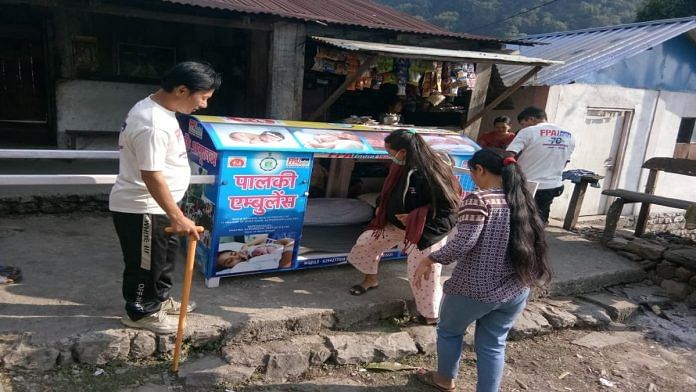
New Delhi: A palanquin or palki, which was once a means to transport brides, is now doubling up as an ambulance for women in Alipurduar, a forested district in north Bengal.
From being a decorated, box-like bridal carriage, it has now been repurposed and equipped with an oxygen cylinder and saline solution, courtesy an initiative by the district magistrate, Surendra Kumar Meena.
The palki ambulance service was started a month ago and primarily serves around 3,000 people — who belong to indigenous tribes — living in 11 villages of the Kalchini block. The block is located at a height of 4,600 ft above sea level in a core area of the Buxa Tiger Reserve, Meena told ThePrint.
The 11 villages fall under the ‘shadow zone’, where there is no mobile connectivity. Since it is a core area of a tiger reserve, the environment ministry does not permit building of any concrete structure including roads or mobile towers there, he added.
ThePrint couldn’t reach any of the villagers for their comments on this initiative due to this lack of connectivity.
“After I was posted here, I saw that pregnant women and sick people were being carried from high altitude villages in sacks. I was thinking of a way to help them. We started speaking to locals, when this idea of having palki as a primary transport came to our minds. The terrain is difficult. The villages are located inside the forested rocky zones,” said the 2011 batch West Bengal cadre IAS officer.
“There is no network connectivity and this makes their life even more complicated. For them, it is a huge drill to get the sick people to hospital. But they are accustomed to this way. We trekked there with our teams to get these villagers vaccinated (against Covid-19). They will never live out of these areas,” he added.
Also Read: Pregnant women vaccinated with mRNA shots pass protection to babies, study finds
A lifeline on precarious terrain
For the indigenous tribes living in the forests, it takes over two hours to trek through precarious terrain from the hilltop to the nearest concrete road and primary health centre (PHC). For a long time, villagers used to carry pregnant women and sick people on makeshift stretchers made out of clothes and bamboo sticks.
At present, two palkis are in service, but eight will soon be added, the DM said, adding that the idea is to ultimately station one palki in each village. “The funds are in place. This way we can cover the whole of 11 villages, located near the India-Bhutan border,” Meena said.
While the service is primarily for pregnant women, the palkis are also used to ferry sick people, the DM said. A trained medical nurse (midwives living in the villages who underwent training) accompanies the palki. Volunteers from the villages carry it till ‘zero point’ (or ground level), which is a concrete road, from where an ambulance then takes the patient to the PHC, or, in serious cases, to Alipurduar District Hospital, around 35 kilometres away.
The DM said the service has been a lifeline for villagers. On 16 January, it was used to ferry 22-year-old villager Pasalam Dupka, as she was writhing in pain in the midst of labour. Volunteers immediately reached her home with the palki and got her to ‘zero point’, where the ambulance was waiting. She delivered a baby girl the same day and both are doing well, the DM said, sharing an image with ThePrint.

Since the service was started, three pregnant women have used the service, and had successful deliveries, the DM said.
(Edited by Gitanjali Das)
Also Read: Dexamethasone use to treat pregnant women with Covid may cause birth defects in babies: Study

COMMENTS